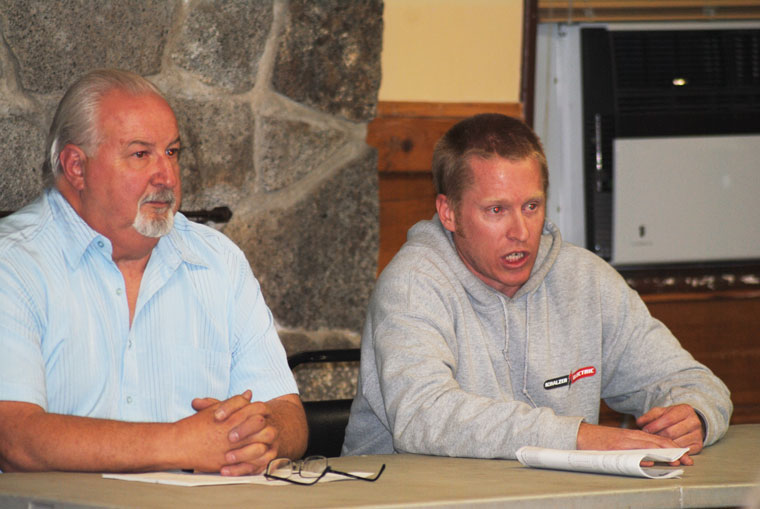
Photo by JP Crumrine
Nearly 100 turned out to the community meeting that Mountain Disaster Preparedness organized to educate residents about the purchase and use of generators.
Opening the meeting, MDP President Mike Feyder and Idyllwild Fire Chief Patrick Reitz stressed both the frequency of power outages and the length of them are going to increase in the future.
“The utility companies have looked at the potential costs [if their equipment contributes to a wildfire],” Feyder said. “We have to understand their concerns and liabilities. We’ll see more and more precautionary outages.”
And Reitz agreed: “The new norm in the mountains is for SCE to turn off our power for safety purposes. Outages are here to stay for all of our safety.”
SCE initiated a public power shutoff in December 2017 because of a Santa Ana wind event, and again in July, after the Cranston Fire began. Another outage inadvertently occurred in October. All of these lasted at least 24 hours and longer.
As Feyder stated, without electricity that long, it is more than an inconvenience. For individuals with some medical conditions and equipment, it can become an emergency.
One result is more and more Hill residents are buying or considering the acquisition of an emergency generator. Given that these outages are stressful and potential emergencies, MDP held this meeting to discuss various aspects of purchasing, installing and using a generator.
Two local and licensed Hill electricians, Jim Manietta and David Schnalzer, were the speakers. They discussed the differences between a portable and a whole-house generator: the fuel options, the permit requirements and issues involving their use, such as connection to panels and prevention of sending power back into the system.
Beginning the discussion, Feyder said, “This is a very complex issue and depends on you defining what usage you need.”
His point was the resident must decide which appliances, such as refrigerator, microwave, lights, television, clothes dryer, air conditioning or others, that they want to keep operational while the utility continues to maintain the power outage. The more appliances that are to be used, the more power one needs, and this determines the size of the generator that will need to be installed.
In response to a question about what size generator is needed to keep a refrigerator cold, all said a portable would be sufficient if that were the only appliance drawing power.
The first question addressed the differences between a portable and a whole-house generator. Schnalzer replied, “A whole-house generator needs less maintenance but must be exercised regularly, for example, monthly and they tend to be safer.” Of course, these tend to be larger and their cost is greater than most portable generators, he emphasized.
Portable generators have to be compliant with both local codes and SCE must approve the unit, Manietta added.
Portable generators are manual and have to be started by the owner when SCE turns off power. But they can be run on either gasoline or propane. Both electricians said propane is easier and safer than storing gasoline, which can go bad over time.
Portable generators should be placed on a concrete surface, such as a pad, or at least on bare ground. They are a fire threat if near dry grass, duff or pine needles.
Safety is the priority whether one uses a portable or whole-house generator. Keep a portable generator in an open area because of the fumes from the burning gasoline.
Although a garage floor is usually concrete, Manietta discouraged the audience from placing a portable generator there.
“Keep it outside,” he said. “Not in a garage, even if you keep the door open.” Wind shifts could push the fumes into the house.
Both Schnalzer and Manietta said the noise from the generator is about the same whether it’s portable or whole house. While one audience member suggested that this type of constant noise could exacerbate one’s anxiety and stress, Reitz commented that during this type of emergency, it was unlikely that the county would be enforcing the noise ordinance.
If the generator is fueled with gasoline, be sure it is fresh. Gasoline will go bad over time, even if stored in a closed container. If propane is the preferred fuel, be sure to know how full the propane tank is. It is possible to get a dedicated tank for the generator, but one should discuss this with their propane supplier.
Schnalzer also suggested that one should know how much fuel is used for the appliances that are being supplied power from the generator.
Feyder also stressed that generators should be maintained. In a recent MDP exercise, four of their eight generators would not start and needed some maintenance.
“Maintenance for whole-house generators can often be scheduled through the manufacturer,” Schnalzer said. “And newer models have a Wi-Fi feature that can send maintenance messages to your cell phone.”
Generators also require a transfer switch to ensure that the electricity they are creating does not go into SCE’s system and possibly create a problem elsewhere, such as a lineman working on lines that he thought had no power. Manietta also emphasized that generators and solar systems need to be completely isolated. Power should not be flowing between them.
And Manietta, Schnalzer and Reitz all reinforced that a permit is needed for installation of a generator. This can take several weeks to obtain, they said. “It’s protection for you against sloppy installation,” one of them stated. Also, it must be California compliant.
Before the session ended, Reitz said he was asked a question as someone left. “If I have a whole-house generator, can I stay if an evacuation order is issued?”
“If they told you to go, leave,” he replied. The evacuation orders are issued because of the threat of fire, not because power is off.









